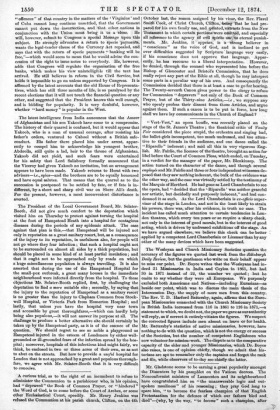A curious trial, as to the right of an incumbent
to refuse to administer the Communion to a parishioner who, in his opinion, had " depraved " the Book of Common Prayer, or " hindered " the Word of God, is to come before the Court of Arches, or some other Ecclesiastical Court, speedily. Mr. Henry Jenkins was refused the Communion at his parish church, Clifton, on the 4th
October last, the reason assigned by his vicar, the Rev. Ravel Smith Cook, of Christ Church, Clifton, being that he had pre- pared for his own family use, and printed, extracts from the New Testament in which certain portions were omittr..d, and especially all reference to the agency of evil spirits an'; to eternal punish- ments. Mr. Jenkins, it appears, is a strong believer in " conscience " as the voice of God, and is inclined to get over difficulties suggested by Scripture language very easily, if his conscience does not approve that language. Appar- ently, he bus recourse to a liberal interpretation. However, he denied, through the counsel who represented him before the Bishop of Gloucester and Bristol's Commission, that he does really reject any part of the Bible at all, though he may interpret some parts in a peculiar way of his own. And consequently the Commission decided that there is at least a case to go for hearing. The Twenty-seventh Canon gives power to the clergy to refuse for Communion "depravers "not only of the Book of Common Prayer, but of the Thirty-nine Articles,—i.e, we suppose any who openly profess their dissent from those Articles, and argue against them. If such a canon is to be put in force, how long- shall we have lay communicants in the Church of England?






































 Previous page
Previous page